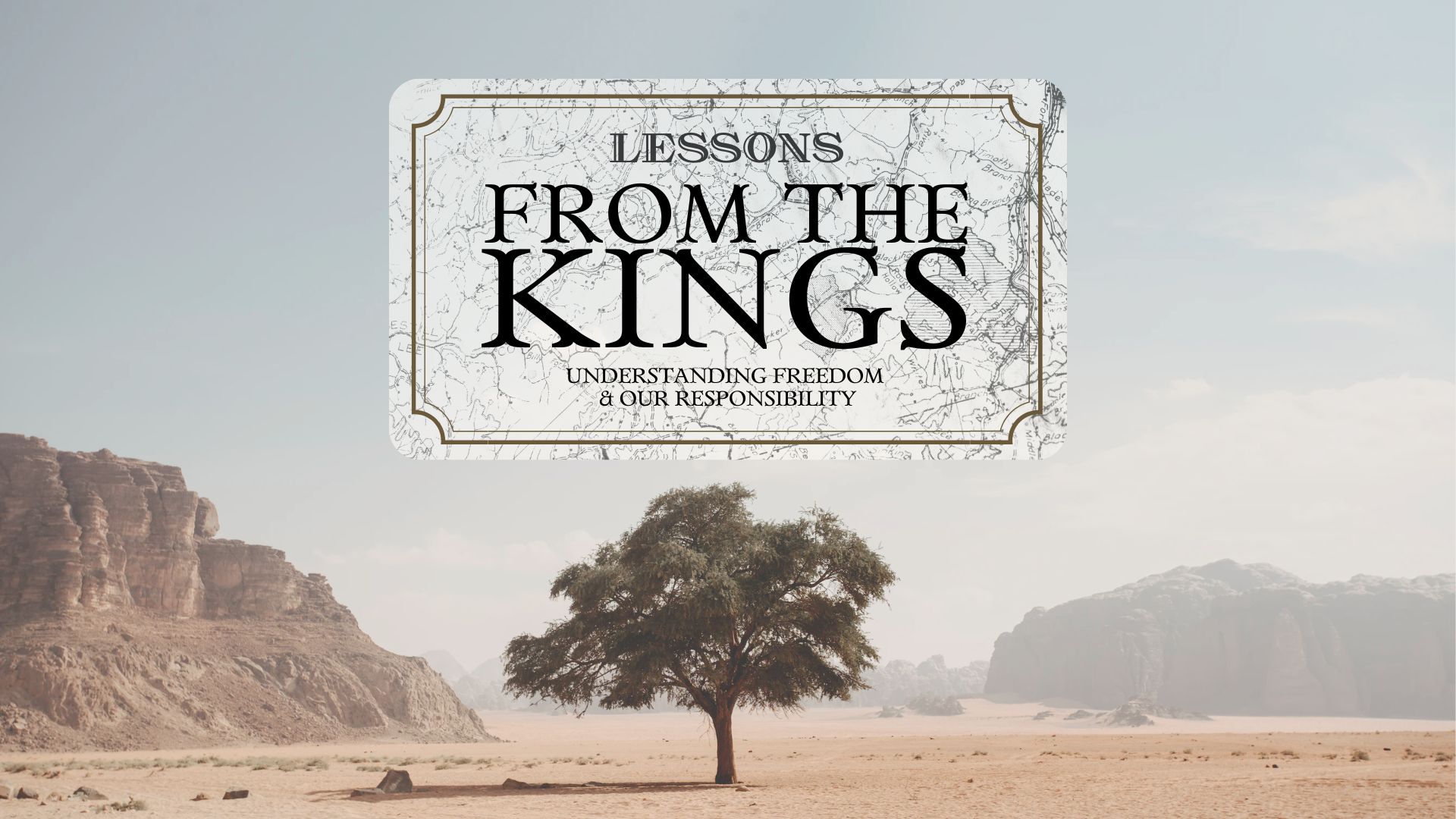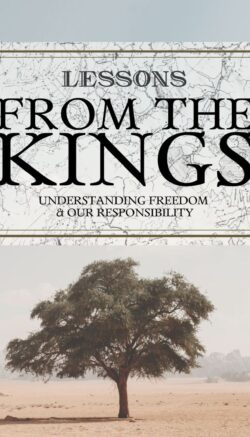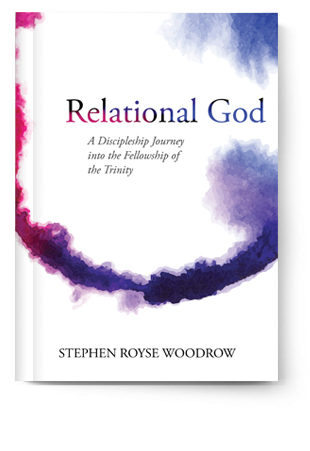 June 25, 2023 Crossroads Church Aspen, Pastor Steve Woodrow
June 25, 2023 Crossroads Church Aspen, Pastor Steve Woodrow
Who is King?
Summer 2023 Series: Lessons from the Kings
Series Description
This summer at Crossroads Church Aspen we will be learning from the kings of Israel as found in 1 and 2 Samuel, 1 and 2 Kings and 1 and 2 Chronicles. With the world becoming more and more chaotic and the general anxiety of society rising we will look to the Word of God for wisdom and peace. We will journey with Israel from rejecting God as their king to having a king like the other nations to the Church’s role in the world. We will look at some big picture stuff like: How do we understand the kingdom of God in light of the current geopolitical landscape. And we will look at some practical issues like: How can it be well with our soul in the midst of so much chaos and transition? And how the freedom found in the Gospel of Jesus Christ transforms people, families and nations.
Let me get some things off my chest as I introduce this series. I have no interest in watering down the Word to simple life lessons and to brush over the tough stuff. Nor to tickle ears or entertain. My calling is to uphold the whole truth of the scriptures, OT and NT, and a glorious God. Also, to reveal what a desperate situation we are in without His glorious grace. I have no interest or biblical imperative for gathering a crowd by addressing felt needs or using emotionalism. I have no desire to preach for a lukewarm normative Christianity that is all knowledge without radical transformative testimonies. I am disturbed and will continue to preach with anguish until the gap between what is described as a vibrant Christian church in the NT is our actual experience here and beyond! So, if there are things in this series that are confusing, that you have never heard, please invite us into your spiritual formation journey. Do not hesitate to ask and pursue understanding – that is what we all need to do. So I am putting these messages into sermon manuscript form if you want to dig deeper and wrestle with these truths.
Who is King?
How humanity has answered this question has formed who they have become, what families have become, what society has become and what nations have become.
How we answer that question today will in turn impact the quality of our hearts, lives, families, society, nations and ultimately our eternal state.
Lesson One:
Read Judges 2:10, 21:25, 1 Samuel 8:1-9, 12:19-25, Eph. 1:7-10; 3:10-11, 1 Peter 3:15
God in His divine tolerance uses Israel’s sin of rejecting Him as King to prepare the way for redemption through King Jesus who is head of the Church today representing His Kingdom on earth until He unites all things in heaven and earth together at His return.
What was the role of the judge of Israel?
“Samuel was the third Levitical judge mentioned in the Bible, Moses (Exod 18:13–26) and Eli (1 Sam 4:18) being the first two. When he grew old, Samuel obeyed the Torah (cf. Deut 16:18) by appointing judges—in this case his sons Joel and Abijah—to function as judges in Beersheba (vv. 1–2). The succession of Eli, Samuel, and his sons suggests that an attempt was being made to bring Israel back to the original Torah pattern of hierocracy, or at least rule by Levites (cf. Deut 17:8–13). Perhaps the belief was that Levites, members of the tribe divinely entrusted with the task of preserving the divine revelation and providing spiritual leadership for Israel, were uniquely qualified to provide the sort of leadership Israel truly needed.”
Bergen, R. D. (1996). 1, 2 Samuel (Vol. 7, p. 114). Broadman & Holman Publishers.
1 Samuel 3:20, Samuel was established as a prophet of the Lord, became he knew the Lord, the word of the Lord coming to him, 3:7, 4:17-18, Eli judged for 40 years, as priest, 7:6, Samuel judged the people.
1 Samuel 8:1-5, Samuel is old, and has been judge over Israel and the Philistines had been defeated all his days, but his sons he appointed and the elders came to Samuel and wanted a king rather than his sons who were corrupt – so this evil the people did, was in desperation they defaulted to the world’s plan rather than wait on the Lord and seek Him as king.
1 Samuel 8:19-20, the World desires a king not God
When people reject God as their ruler, they are submitted to earthly kings and governments which will only serve themselves ultimately and manipulate the people and control them as seen in 1 Samuel 8. That is the progression of earthly government.
Who is King? Today it is ever since King Saul, Israel became a nation like the other nations and gradually lost their distinction as God’s people with God reigning as King. But God used this sin of Israel to show them and us like all nations the consequences of rejecting God, as King, Israel believed in God, but rejected Him as King. So God showed them over the course of many kings and failures that in earthly king cannot lead without God leading.
What happens to Church people when they lose faith in church leaders put their faith in politics, worldly gov – and misled to put their trust in a political king rather than the king of kings, but this is the same mistake Israel made in wanting a king like the other nations.
1 Samuel 12, he rebukes the people on his death bed for rejecting God as their king, but God does not forsake His people even in all this.
1 Samuel 12:19-25
So even in our sin, God is gracious, while we were yet sinners Christ died for us. (Romans 5:8) His plan of redemption is greater than our sins, the worldly powers, and the devil etc. God’s plan of redemption is greater than the consequences of sin. (Rom 8:28-30.)
God works His glorious plan of redemption of uniting all things in heaven and earth together in the midst of our sin, and He even uses it, works with it, and this explains all kinds of things like polygamy and other things that God seemed to tolerate for awhile (Romans 3:23-26) and why He allows Israel to have a King and reject Him.
Rejecting God as King and adopting an earthly king like the other nations comes with all kinds of other sins of earthly kingdoms like evil power politics, polygamy, etc. (1 Samuel 8)
Not everything we ask for and get are necessarily blessings from the Lord. What do you think about this? It still doesn’t nullify that truth of Romans 8:28, that He works all things for our good.
Israel wanted a king, not God – that’s what they got. Solomon wanted more wives that’s what he got, but they stole his heart away from God.
Not everything we ask for and get are necessarily blessings from the Lord. Do we know the difference? Can we truly say we want His kingdom to come and His righteousness more than anything, and that to be the primary inheritance for our children?
Ephesians 1:7-10
7 In him we have redemption through his blood, the forgiveness of our trespasses, according to the riches of his grace, 8 which he lavished upon us, in all wisdom and insight 9 making known to us the mystery of his will, according to his purpose, which he set forth in Christ 10 as a plan for the fullness of time, to unite all things in him, things in heaven and things on earth.
Build a bridge to Ephesians 1:10, 3:10, to show now the beautiful powerful important role of the Church that God now reigns through the Church, disciples unto the nations and the Gospel is to be setting Jesus as Lord in our hearts. Unless God is Lord of our heart, enthroned upon our heart, we and all mankind will go the way of the kings.
Ephesians 3:10-12
10 so that through the church the manifold wisdom of God might now be made known to the rulers and authorities in the heavenly places. 11 This was according to the eternal purpose that he has realized in Christ Jesus our Lord, 12 in whom we have boldness and access with confidence through our faith in him.
Remember: the world and its governments want a king not God!
Raise up the glory of the Church, it is to represent the Kingdom of God, where Jesus reigns as head of His church until He returns uniting all things in heaven and on earth. Eph 3:10, the powers and principalities are the fallen rulers over the nations of the world who are led by the devil himself. Is this too spiritual for your western mind, is this an affront to your intellect? This is the biblical worldview.
The way of the Kings is ultimately the way of the world under the influence of the gods of the world, the devil, fallen angels and demons.
Eph 3:10, power and principalities represent these worldly national powers and the Church is to be the representative of the Kingdom of God, Jesus as Lord, King so we are not primarily citizens of the world but of His kingdom. Connect Eph. 3:10 with Eph. 6:12 to show that the rulers and authorities are evil spiritual forces.
The glory of the Gospel is that it makes Jesus King of our heart, sets us apart as a holy nation with an eternal inheritance. 1 Peter 3:!5, is in the context of a church which was suffering persecution.
1 Peter 3:15
15 but in your hearts honor Christ the Lord as holy, always being prepared to make a defense to anyone who asks you for a reason for the hope that is in you; yet do it with gentleness and respect,
Is Jesus the Lord, the King of your heart? Is He going to be King of the Church today and our lives?
Teach Jesus is King and the importance of honoring authority and the discipline that goes with that – the church is to represent the God designed authority structure of Jesus reigning and the Father on the throne. Today everything is about tearing that down. Woe to the church that doesn’t uphold this structure of authority and caves to culture. The glory and word of the Lord will leave and they will be removed from his presence, the lamp stand will be removed. (Revelation 2:5)
Our life now and our role in His Church is a dress rehearsal for eternity.
May our time be a restoration of regular words from the Lord and frequent visions, the restoration of Acts and from 1 Samuel 3:1. For even the church age can move into a time of spiritual famine.
Lesson Two:
Read 1 Samuel 15:17-24, John 10:27
Partial obedience is not obedience. Jesus is King of our heart when we listen and obey by faith.
To obey and listen to the voice of God is better than the ritual of religion. No matter how much we give or sacrifice in what we perceive as good efforts, it cannot surpass obedience. God wants our heart. Today, no amount of social justice will bring about ultimate good if there is not obedience to God’s Word. (John 15:5)
He is King in our heart when we listen to and obey His Word, Ways and Will.
Beware of mis-guided fear, Jesus is King of our heart when we listen and obey with faith in Him greater than fear of others.
Beware of spiritual manipulation, doing something that appears good with a wrong hidden motive.
1 Samuel 13-15, lessons from Saul, ch 15:22, to obey is better than sacrifice, obedience is listening, partial obedience is not obedience and reveals a heart not whole heart toward God, verse 24 – I feared the people and obeyed their voice – man pleasing rather than God pleasing
1 Samuel 15:22
22 And Samuel said, “Has the Lord as great delight in burnt offerings and sacrifices, as in obeying the voice of the Lord? Behold, to obey is better than sacrifice, and to listen than the fat of rams.
“The third couplet (v. 23a) provides two of the three logical premises that underlie the serious punishment announced at the conclusion of the final couplet. The first line of the third couplet states that “rebellion” (Hb. merî; v. 23), or willful disobedience, is as serious a sin as the capital “sin of divination.” The conclusion of the couplet declares that “arrogance,” or insubordination (Hb. ʾaven), is equivalent to “idolatry” (tĕrāpîm), presumably since it likewise involves the removal of Yahweh from his rightful place in every person’s life, or as A. F. Kirkpatrick notes, “It elevates self-will into a god.” Interestingly, before Saul’s life ended, he and a member of his family would be connected with both divination (cf. 28:7–19) and tĕrāpîm (cf. 19:13).”
Bergen, R. D. (1996). 1, 2 Samuel (Vol. 7, pp. 172–173). Broadman & Holman Publishers.
“What had motivated Saul to move away from obedience to God’s command? Fundamentally it was misdirected fear: instead of fearing the Lord as required by the Torah (cf. Lev 19:14; 25:17; Deut 6:13, 24; 10:12, 20), Saul “was afraid of the people” (cf. Mark 11:32; John 7:13). Because of that misguided fear, Saul “listened to the voice of” (“gave in to”) the people instead of listening to the Lord’s voice as required by the Torah (cf. Deut 27:10). Perhaps the desire to achieve economic gain by sparing Agag in exchange for ransom or trade concessions from the Amalekites had also led Saul into sin (cf. 1 Tim 6:10).”
Bergen, R. D. (1996). 1, 2 Samuel (Vol. 7, p. 173). Broadman & Holman Publishers.
John 10:27
My sheep hear my voice, and I know them, and they follow me.
How much time do we spend listening for His voice versus hearing lots of other voices? When we are pressured and under the gun to respond to something or make a decision, do we take time to pull away and seek the voice of the Lord?
We need two evaluate our devotion. Are we coming to the communion table out of religious ritual or from a heart that is in line with God’s Word and Ways and Will?
Lesson Three:
Read Judges 2:10, 21:25, 1 Samuel 2:12-17, 22-29, 3:13, 8:1-5, 16:7, Malachi 4:5-6, Matthew 28:18-20
Healthy people, churches and nations are dependent upon the passing down of generational faith where the next generation knows the voice and heart of God and that Jesus is King of all!
1 Samuel 3:13, the iniquity of Eli and Samuel’s sons, for not disciplining his sons!! This possibly resulted in the people’s lack of confidence in the prophet and judge and led them to ask for a king rather than ask God to rebuke and revive His leaders.; Tie this to Judges 2:10 and 21:25 to see how quick the generations can fall away.
1 Samuel 8 – great problems of lack of discipleship and preparing the next generation, Why were Elis and Samuel’s sons so ungodly, where was the breakdown? So in fear of the future and corruption in the office of judge and prophet the people lost faith and asked for a king, rejected God as King, not trusting His guidance – they deferred to the world to be like all the other nations,
1 Samuel 16:7
“For the Lord sees not as man sees: man looks on the outward appearance, but the Lord looks on the heart.”
Passing down generational faith is more important than generational wealth in that generational wealth will follow generational faith, but generational faith will not follow generational wealth.
Both Eli and Samuel passed down to their sons the form of religion in the priesthood, that included wealth and privilege, but failed to pass down a heart for the Lord with great tragic consequences in both. This failure taints the entire history of the Kings of Israel and the history of the Church.
We can see the Jesse Davids father did not even see the potential and heart of his youngest son David.
1 Samuel 8:19, 8:3-5, 3:13, this seems to be a trend throughout the kings and is today – what can we learn moving forward about importance of discipleship preparing the next generation?
“Then, in a particularly memorable statement the Lord uttered one of the most important statements in all of Scripture regarding divine concerns and human capacities. God first affirmed his fundamental “otherness”: “the Lord does not look at the things man looks at” (v. 7). Neither the Lord’s considerations nor his abilities are the same as those of humans; whereas “man looks at the outward appearance” (lit., “the eyes”), “the Lord looks at the heart.” The Lord alone has the capacity to observe and judge a person’s “heart” (Hb. lēb), that is, one’s thoughts, emotions, and intents. On God’s scales these matters outweigh all other aspects of a human life.”
Bergen, R. D. (1996). 1, 2 Samuel (Vol. 7, p. 179). Broadman & Holman Publishers.
The Old Testament ends with a hopeful prophecy of what God is going to do in restoring the hearts of fathers to their children. This is part of what defines healthy people, churches and even nations, it is a picture of the household of God and the powerful work of the Spirit. Tie Malachi 4:5-6 to Luke 1:16-17.
Malachi 4:5-6
“Behold, I will send you Elijah the prophet before the great and awesome day of the Lord comes. 6 And he will turn the hearts of fathers to their children and the hearts of children to their fathers, lest I come and strike the land with a decree of utter destruction.”
4




